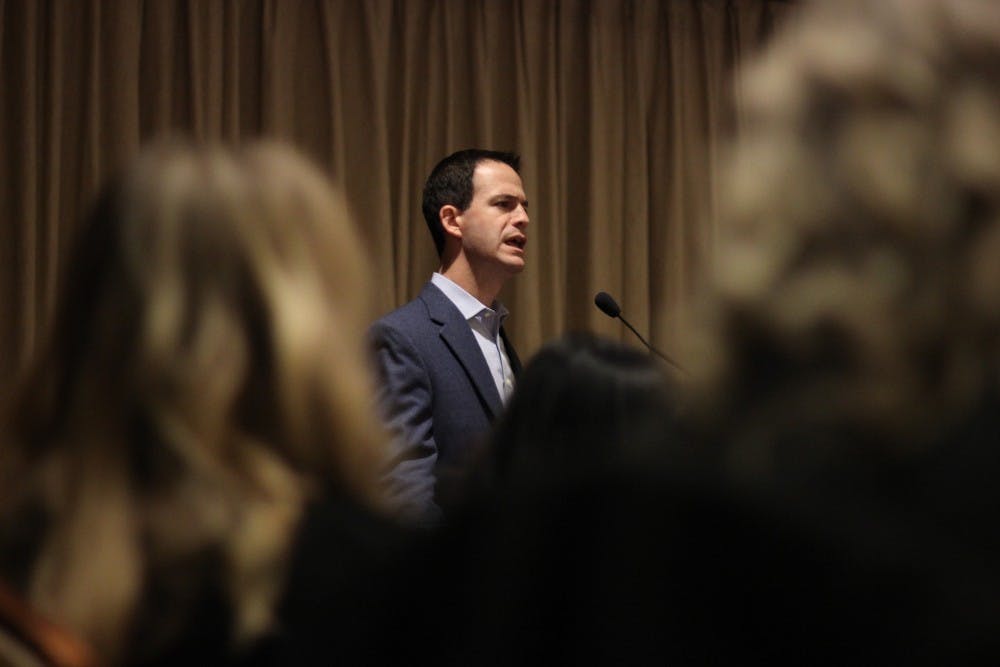Calley, Cotter talk roads and economic recovery at Soaring Eagle legislative breakfast
Lt. Gov. Brian Calley and Michigan House Speaker Kevin Cotter met with constituents and Isabella County leaders Friday morning at Soaring Eagle Casino to discuss pending legislation in Lansing and Washington D.C.
On the top of their agenda were updates on new road funding legislation and moves made in the governor's office to strengthen the state's ongoing economic recovery.
On roads, Cotter said the Michigan legislature is the closest its ever been to passing a significant road repair funding bill. The House passed a $1.2 billion package for roads that is now being debated in Senate chambers.
The new measure will pull $600 million from existing revenue sources and $600 million from new taxes and fees. Much of the fight over roads in recent years has been about where the money will come from. Earlier attempts to increase the state's sales tax to solely fund roads failed miserably.
Cotter believes this time, the state House and Senate have finally reached a "grand compromise."
"There are serious costs to inaction," he said. "We've argued about the size of the problem, but the size of the problem keeps getting worse over time. The plan we're introducing now is something I'm very proud of."
On energy, Cotter detailed some of the challenges in Michigan's federally mandated shift away from coal fired plants. The Environmental Protection Agency ordered the state to close nine coal fired plants across the state, prompting some officials to worry about "rolling blackouts" in the aftermath.
Cotter attempted to reassure constituents that the legislature is doing everything it can to ensure that doesn't happen. He said the state is looking into buying power from other states, while creating natural gas generation plants to offset the loss.
In Calley's address, he touted Michigan's economic recovery as strong, citing recent debt and unemployment statistics as evidence of growth.
"We have $20 billion less debt than we did in 2010," Calley said. "Our employment rate is now below the national average, and historically, Michigan unemployment has always been above the national average."
In terms of jobs, Calley said he and Gov. Rick Snyder have made progress making Michigan better environment for job growth. Calley recalled his recent visit to India, saying that it showed him how other countries view opportunities in Michigan.
"The reason countries are looking at Michigan to invest in is because they see a large concentration of engineers, design professionals and innovation," Calley said. "That’s what they want to be close to."
Having a base for innovation and development in Michigan is driving the reduction in unemployment, yet there is much more work to be done, he said.
"(We have to focus) on the people who get left out of an economic comeback," Calley said. "Some look at 3-4 percent unemployment and feel that's full unemployment; that 3-4 percent of the workforce isn't employable. Why? We need to challenge those assumptions."
On education, Calley said maintaining access to higher education is the cornerstone of sustainable job growth. For him keeping college and trade schools affordable can help increase access. Yet for some minority populations at Central Michigan University, state funding is far from abundant.
The state's Native tuition waiver has been underfunded for many years, leaving universities like CMU to front the rest of the bill.Last year, the state paid $300,000 toward the program; CMU picked up the remaining $1.3 million.
When asked about when the state will fully fund the program, Calley backpedaled, extolling Lansing's committment to all students.
"We've made a significant investment to ensure there are opportunities for everyone," he said. "I do believe we gave (CMU) more than $300,000. The money we give to colleges and universities can use that money for a lot things other than that.
"It's up to them how they use it."




